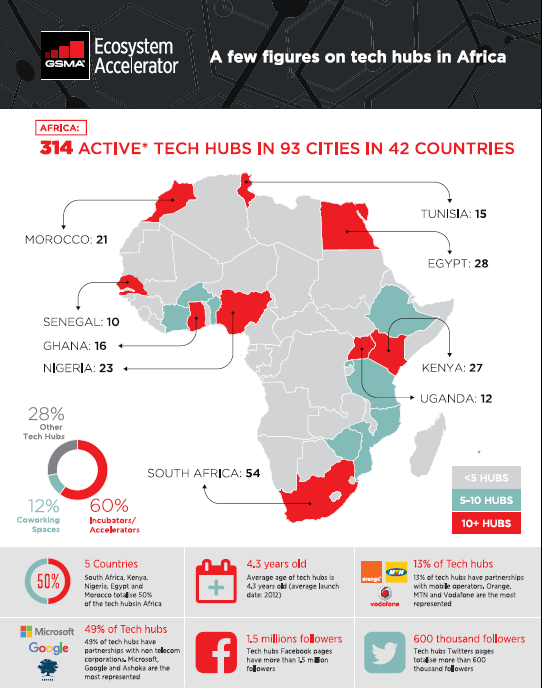Africa, the world’s second-largest and second-most-populous continent, is witnessing a remarkable transformation. Its vast natural resources, youthful population, and increasing political stability have created a fertile ground for economic growth and investment opportunities. In this article, we explore the myriad opportunities that Africa presents and delve into how young entrepreneurs and CEOs can capitalize on them. Join us on a journey to discover more untapped potential and abundant opportunities in Africa.
Understanding Africa’s Rising Economy:
Africa’s economy is experiencing rapid growth, with several countries showcasing impressive GDP growth rates. The following are some of the sectors driving this expansion:
- Technology: Africa is a hotbed of innovation, with startups in a variety of technology sectors, including mobile payments, e-commerce, and fintech, making significant progress.

Source:TechCrunch - Agriculture: Africa is home to a young and growing population, which is putting a strain on the continent’s food supply. However, Africa also has a wealth of agricultural resources, and there are many opportunities for entrepreneurs to develop innovative solutions to the continent’s food security challenges.

Agriculture sector in Africa - Renewable energy: Africa is blessed with abundant renewable energy resources, such as solar and wind power. There are many opportunities for entrepreneurs to develop renewable energy projects that can help to meet the continent’s growing energy needs.

- Manufacturing: Africa’s manufacturing sector is still in its early stages of development, but there are many opportunities for entrepreneurs to invest in this sector. The continent has a large and growing market for manufactured goods, and there are also opportunities to export manufactured goods to other countries.
- Telecommunications: Africa is increasingly becoming connected, with mobile phone penetration rates reaching over 50% in many countries. This has created a growing market for telecommunications services, and there are many opportunities for entrepreneurs to develop innovative telecommunications solutions.
Embracing the Digital Revolution:
The advent of digital technology has revolutionized Africa’s business landscape. Mobile connectivity, fintech innovations, and e-commerce platforms have transformed the way business is conducted in Africa. The following are some examples of how young entrepreneurs have leveraged the digital revolution to create successful businesses:
- M-Pesa: is a mobile money service that was launched in Kenya in 2007. It has since become one of the most successful mobile money services in the world, with over 30 million active users. M-Pesa has helped to revolutionize the way people in Africa send and receive money, and it has also played a role in reducing poverty.
- Jumia: is an e-commerce company that was founded in Nigeria in 2012. It is now one of the largest e-commerce companies in Africa, with operations in over 14 countries. Jumia has helped to make it easier for people in Africa to shop online, and it has also created jobs and opportunities for entrepreneurs.
- Farmcrowdy: is an online platform that connects farmers with investors. It was founded in Nigeria in 2016, and it has since helped to raise over $1 million for farmers. Farmcrowdy has helped to improve the lives of farmers and to increase food security in Nigeria.
Mastering the African Market:
Africa is a continent of diversity, presenting unique cultural, linguistic, and regulatory challenges. However, there are also many opportunities for entrepreneurs who are willing to take the time to understand the market and to build relationships with local partners. The following are some tips for navigating the African market:
- Do your research: Before you enter the African market, it is important to do your research and understand the market. This includes understanding the local culture, the legal system, and the competition.
- Build relationships: Networking is essential for success in Africa. Make an effort to build relationships with potential customers, partners, and investors.
- Be patient: It takes time to build a successful business in Africa. Don’t expect to become an overnight success.
- Be persistent: There will be challenges along the way. Don’t give up if you face setbacks.
Fostering Sustainable Development:
Africa’s sustainable development is intricately linked to its economic growth. There are many opportunities for entrepreneurs to incorporate sustainability practices into their business models, such as promoting renewable energy, sustainable agriculture, and social entrepreneurship.
- Renewable energy: Africa is blessed with abundant renewable energy resources, such as solar and wind power. There are many opportunities for entrepreneurs to develop renewable energy projects that can help to meet the continent’s growing energy needs while also reducing greenhouse gas emissions.
- Sustainable agriculture: Africa is home to a large and growing population, which is putting a strain on the continent’s natural resources. However, there are many opportunities for entrepreneurs to develop sustainable agricultural practices that can help to protect the environment and ensure food security for future generations.
- Social entrepreneurship: Social entrepreneurship is a type of business that seeks to solve social problems while also generating a profit. There are many opportunities for social entrepreneurs to make a positive impact on Africa by developing businesses that address issues such as poverty, education, and healthcare.
Funding and Investment Opportunities:
Access to capital remains a key challenge for many entrepreneurs in Africa. However, there are a number of funding options available, including venture capital, impact investing, and government-backed initiatives.
- Venture capital: Venture capital is a type of investment that is typically provided to early-stage companies with high growth potential. There are a number of venture capital firms that invest in African businesses.
- Impact investing: Impact investing is a type of investment that seeks to generate both financial returns and social impact. There are a number of impact investing funds that invest in African businesses.
- Government-backed initiatives: There are a number of government-backed initiatives that provide funding to businesses in Africa. These initiatives can be a valuable source of funding for businesses that are unable to access venture capital or impact investing.
Africa is teeming with opportunities for young entrepreneurs and CEOs willing to seize them. In this article, we have explored the diverse sectors driving Africa’s growth, the transformative power of digital technology, strategies for navigating the African market, the importance of sustainable development, and avenues for funding and investment. By embracing Africa’s potential and leveraging its unique strengths, young CEOs can make a significant impact while building successful and socially responsible businesses.
Remember, the future of Africa lies in the hands of visionary young leaders, and the time to seize the opportunity is now. Join the movement and unlock Africa’s boundless potential with us.













